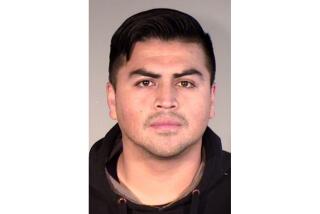La Placita’s Beloved Former Pastor Luis Olivares Afflicted by AIDS
A few days after he was found to have AIDS, and still weak from a serious bout with meningitis, Father Luis Olivares got up out of his hospital bed to keep a date with his parishioners at historic Our Lady Queen of Angels Church.
It was to be his last Mass at La Placita, as the church is known to parishioners--his despedida , or going away celebration. After nine years as pastor of the landmark downtown church, Olivares was to be transferred to another parish. The parishioners were aware that he had been ill but did not know of the AIDS.
Olivares celebrated Mass from his wheelchair and gave a stirring homily. “The feeling between him and the people there was unbelievable,” his former associate pastor, Father Mike Kennedy, said. “There wasn’t a dry eye in the house.”
Olivares, who has crusaded tirelessly on behalf of his flock--declaring La Placita a sanctuary for Central American refugees and for undocumented immigrants--is now facing the toughest personal battle of his life.
Friends and sympathizers began rallying to his support while he was still at the hospital recovering from meningitis last month. In the course of treating him for the bacterial infection that attacks the brain and spinal cord, doctors discovered that he had the AIDS virus. Doctors said they believed that he contracted the disease from contaminated needles while undergoing treatment for other ailments in his travels in Central America.
Olivares made the nature of his illness public soon after the Sunday Mass at La Placita. He did it, he said, to “let people know that anybody can get this disease and not to abandon those who happen to get it, regardless of how they contracted it.”
Flowers, posters and other expressions of support from his many friends in the community crowded his hospital room last month. A stream of visitors included union leader Cesar Chavez, actor Martin Sheen and Los Angeles Archbishop Roger M. Mahony. Later, in a statement, Mahony voiced sadness about Olivares’ illness and admiration for his work.
“Father Olivares has served the poorest of the poor here in Los Angeles with great commitment and courage, and he has aroused the conscience of us all as we try to understand our responsibilities toward newly arrived peoples and those whose lives are not sheltered by laws and protections,” he said.
Noting that he and Olivares “have approached various social issues with different strategies at times,” he added that they nevertheless share a commitment to “live out the Gospel.”
Olivares, who had been scheduled to report to a new parish in Ft. Worth, Tex., said his Claretian Order has released him from that obligation. He plans instead to live in Los Angeles.
Doctors said it was impossible to predict how long Olivares will survive. But they said that, once the illness manifests itself in a serious infection as it had with Olivares, the patients generally live from two to six years longer.
“Though it sounds very terminal, I haven’t given up,” a frail and unusually soft-spoken Olivares said. “I have a lot of hope.”
Dr. Laurence Heifetz, Olivares’ primary physician, said the priest had almost fully recovered from the meningitis when he was released from the hospital late last month. “We expect he’ll get back to normal before the next manifestation of the HIV (AIDS virus) will hit,” he said.
Dr. Davida Coady, a professor of medicine at UCLA and a personal friend of Olivares’, said, “We hope he will have several years of active life.”
Olivares has traveled numerous times to Central America since 1984 to visit refugee camps and to meet with government and church officials.
Coady, an expert on medicine in underdeveloped countries, said she checked with several clinics in El Salvador where Olivares had received treatment for various minor maladies related to his health problems, including diabetes.
The physician said she is convinced that the priest was infected with the AIDS virus at a clinic six years ago where medication was injected, apparently with contaminated needles. Although she declined to provide further details about the clinic, citing confidentiality issues, she said she learned that other people have been infected with the AIDS virus at the same facility. Heifetz said he concurred with Coady’s assessment.
More to Read
Sign up for Essential California
The most important California stories and recommendations in your inbox every morning.
You may occasionally receive promotional content from the Los Angeles Times.










